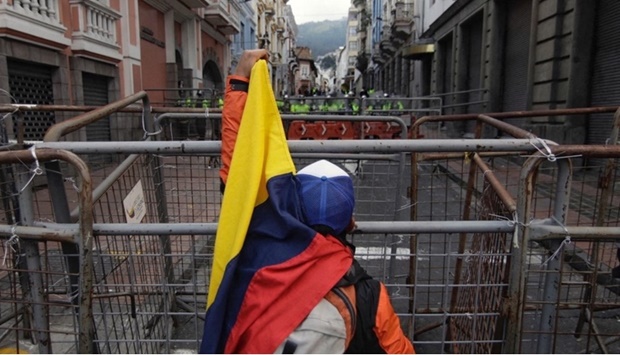Ecuador's President Guillermo Lasso declared a state of emergency in three provinces late Friday in response to sometimes violent protests by Indigenous groups demanding cuts in fuel prices.
Oil producer Ecuador has been hit by rising inflation, unemployment and poverty exacerbated by the coronavirus pandemic.
Fuel prices have risen sharply since 2020, almost doubling for diesel from $1 to $1.90 per gallon (3.8 liters) and rising from $1.75 to $2.55 for petrol.
Demonstrators from the country's Indigenous community -- which makes up over a million of Ecuador's 17.7 million inhabitants -- launched an open-ended anti-government protest this week that has since been joined by students, workers and others.
The demonstrations have blocked roads across the country, including highways leading into the capital Quito.
Clashes with security forces during the protests have left at least 43 people injured, and 37 have been arrested.
In response, Lasso's decree Friday -- which covers Quito -- enables the president to mobilize the armed forces to maintain order, suspend civil rights and declare curfews.
"I am committed to defending our capital and our country," Lasso said on television.
"I called for dialogue and the response was more violence. There is no intention to seek solutions."
The demonstrations have largely been concentrated in the northern region of Pichincha and neighboring Cotopaxi and Imbabura.
With spears in hand, Indigenous Amazonians this week temporarily occupied local government headquarters in the provinces of Pastaza and Morona Santiago.
The country's armed forces on Twitter condemned "the violent actions carried out by protesters" in Pastaza, saying one person had been left with "fractures and multiple injuries."
In Quito, nearly 1,000 protesters tried to tear down metal fences that surround the presidential headquarters.
- No compromise -
In a bid to ease grassroots anger, Lasso announced in his address late Friday a small increase in a monthly subsidy paid to Ecuador's poorest, as well as a program to ease the debt of those who have loans from state-run banks.
Lasso, a rightwing ex-banker who took office a year ago, met Thursday with Indigenous leaders to assuage discontent but the discussions apparently yielded little result.
Producers of flowers, one of Ecuador's main exports, complained Friday that due to the roadblocks, their wares were rotting.
But the powerful Confederation of Indigenous Nationalities of Ecuador (Conaie), which called the protests, has said it will maintain the road blockades until the government meets 10 demands.
Conaie -- which has been credited with helping topple three Ecuadorian presidents between 1997 and 2005 -- wants prices reduced to $1.50 for diesel and $2.10 for petrol, a demand the government has so far rejected.
Its other demands include food price controls and renegotiating the personal bank loans of about four million families.
In response to Lasso's decree, the head of Conaie, Leonidas Iza, insisted the protests would go on "indefinitely."
"From this moment we prepare the mobilization" of activists to Quito to maintain the protests, he added, without specifying when the demonstrators would arrive.
The protests have so far caused about $50 million in damage to the economy, according to the Ministry of Production.
But Conaie has called for an end to the violence.
"Vandalism, confrontation, violence cannot be accepted," said Iza.

